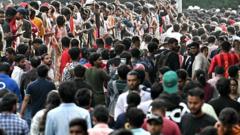A conversation with philosopher Susana Monsó on animal minds and their interpretations of loss.
What Animals Reveal About Our Understanding of Death

What Animals Reveal About Our Understanding of Death
Exploring how different species, including orcas and ants, navigate the concept of mortality.
In the summer of 2018, the emotional journey of an orca named Tahlequah captured global attention when she gave birth to a calf that tragically died just thirty minutes after birth. Demonstrating an incredible display of grief, Tahlequah carried her calf’s body for over two weeks, often balancing it on her nose while swimming. This poignant act resonated with many, leading Susana Monsó, a philosopher specializing in animal cognition from the National Distance Education University in Madrid, to reflect on the connections between human experiences of loss and the behaviors observed in other species.
Dr. Monsó emphasized that the act of Tahlequah clinging to her deceased calf is a behavior that many can relate to, especially for those who have experienced personal losses. While it is essential to avoid anthropomorphism—attributing human emotions and motives to animals—Dr. Monsó argues that such behaviors suggest a more complex understanding of death within the animal kingdom than often assumed. In her recently released book, "Playing Possum," she posits that many species possess at least a basic comprehension of death.
During an interview with The New York Times, Dr. Monsó elaborated on her findings, discussing the delicate balance between recognizing animal cognition and avoiding the pitfalls of projecting human emotions onto non-human species. By examining the behaviors of various animals, including ants and orcas, she sheds light on the conceptual landscape around death and how it might not be a phenomenon limited to humans alone. Dr. Monsó’s insights challenge traditional views of intelligence and emotionality in the animal world, prompting a reevaluation of how we see our non-human counterparts as they navigate their own experiences of loss and mortality.






















